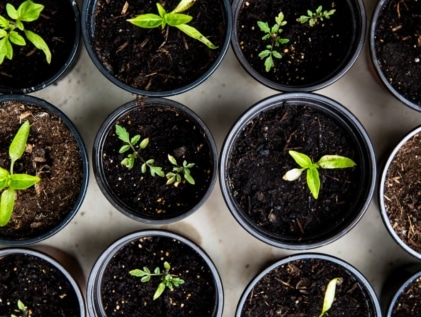Many of our loved ones are spending more time at home these days, maybe due to a recent retirement or the ongoing COVID-19 pandemic, and are finding themselves with more empty hours to fill. For many seniors, finding a hobby is essential in the quest to bust boredom and keep spirits high. Encouraging your loved one to try new hobbies is an excellent way to sharpen cognitive ability, keep the mind active and engaged, remain socially active, and prevent the symptoms of depression that can lead to serious health problems.
There are a number of hobbies and activities for seniors to choose from that don’t require leaving home. One of our favorites is gardening. Whether it’s a simple flower bed, or a bustling vegetable and herb garden, gardening is an excellent option because of its many benefits:
Decreased Risk of Dementia
While there doesn’t seem to be a single cause of dementia, certain lifestyle choices can lower your risk. Regular exercise is at the top of that list, and a recent study found that almost any type of physical activity, including gardening, can reduce the risk of dementia. Furthermore, growing a vegetable garden will promote healthy eating, and a diet rich in vitamins, minerals, and nutrients can also lower the risk of cognitive decline.
Daily Dose of Vitamin D
Exposure to the sun aids in vitamin D production, which helps the body to absorb calcium. Calcium is critical to bone health and strength, especially as we age. A 2014 study found that exposure to sunlight while gardening helped seniors reach higher levels of vitamin D as opposed to those spending more time indoors.
Lower Stress Levels
High levels of stress can have a negative impact on cognition, attention, and memory. Gardening is a fantastic way to temporarily disengage from everyday distractions and stressors. Studies have shown that gardening for even a short amount of time can improve mood and lower cortisol levels, the hormone associated with stress.
For some seniors, the physical demands of gardening (bending over, kneeling, getting down on the ground) can be limiting. Consider the following tips and tools to help your loved one garden comfortably:
- Install a raised garden bed that is high enough to be tended to from a walker or wheelchair.
- Purchase a rolling garden cart for comfortable sitting and easy maneuvering.
- Encourage your loved one to stay safe while in the sun, especially during the hot summer months, with light-colored clothing, sun hats, and sunscreen.
- Research ergonomic tools that will make gardening easier for seniors and those that are disabled or have arthritis.
If you or your loved one is not sure how to get started, there are plenty of resources that can help you start your planning and research. Between considering seasonality, picking your flowers or vegetables, and so much more, there is no shortage of advice and recommendations available for those just starting out.
Gardening is not just for seniors; it can benefit people of all ages. Get the whole family involved in your loved one’s new hobby as a way to connect and bond. You might be surprised by how invested you all become!

